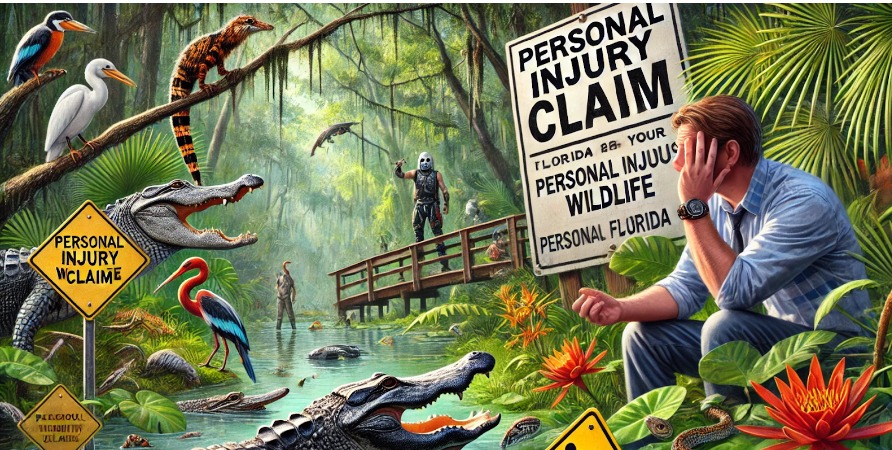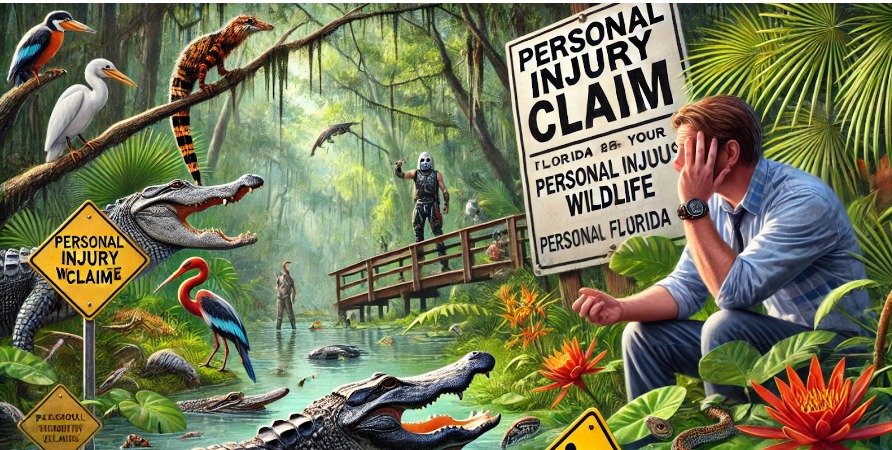- All Plans
- Yahoo Press Release
- Bloomberg Press Release + Yahoo Finance
- Business Insider Press Release
- Benzinga Press Release
- Digital Journal Press Release
- US Times Now Press Release
- AP News Press Release
- Yahoo Finance Press Release
- Street Insider Press Release
- MSN News Press Release
- USA Today Press Release
RTRLAW Explores the Risks of Florida’s Wildlife and Related Injury Claims

Florida is renowned for its beautiful landscapes and diverse wildlife, but these features also bring unique risks. Hidden dangers often lurk where least expected, leading to various injuries. Understanding these hazards is crucial for both residents and visitors alike.
United States, 9th Jul 2024 – Florida is renowned for its beautiful landscapes and diverse wildlife, but these features also bring unique risks. Hidden dangers often lurk where least expected, leading to various injuries. Understanding these hazards is crucial for both residents and visitors alike.

Wildlife in Florida, ranging from alligators to snakes, poses significant threats. Encounters with these animals can lead to serious injuries. Personal injury claims related to such incidents often involve complexities due to the state’s unique liability laws. Property owners, for instance, must be aware of their duty to warn of hidden dangers to avoid legal repercussions.
Those injured due to wildlife encounters or other accidents may need legal assistance. A personal injury lawyer in Florida can help navigate the intricate legal landscape, ensuring victims seek the compensation they deserve. Adequate knowledge and preparation can make all the difference in addressing these hidden dangers effectively.
Understanding Florida’s Personal Injury Law
Florida’s personal injury law encompasses multiple aspects, such as negligence, comparative negligence, and statutes of limitations, which are fundamental to the process of filing a personal injury claim. These legal concepts ensure fair handling of cases and determine the parameters for seeking compensation for injuries and damages.
Key Principles of Negligence in Injury Cases
Negligence is a critical aspect of personal injury law in Florida. A plaintiff must establish that the defendant owed a duty of care and breached this duty through negligence or wrongful actions. Furthermore, there must be a clear causation linking the breach of duty to the injuries sustained by the plaintiff.
The duty of care varies depending on the relationship between the parties involved. For example, a driver must obey traffic laws to avoid harming other road users, and a property owner must maintain safe premises. Proving negligence requires demonstrating that the defendant’s actions or lack thereof directly caused the injury, which can involve gathering evidence like witness statements and expert testimonies.
Statute of Limitations and Its Impact on Claims
The statute of limitations is a critical timeframe within which personal injury claims must be filed. In Florida, individuals typically have up to four years from the date of the incident to file a lawsuit for personal injuries. This timeframe is significantly shorter for certain types of claims, such as medical malpractice, which has a two-year limitation.
Delaying the filing of a claim can result in losing the right to seek compensation. It’s crucial for injured parties to act promptly and consult with legal professionals to ensure that the deadlines are met. Exceptions to these limits can apply under special circumstances, such as when the injury is discovered later or the injured party is a minor.
The Role of Comparative Negligence in Florida
Florida operates under a pure comparative negligence system, which impacts how compensation is determined in personal injury claims. Even if the injured party is found partially at fault for the accident, they can still recover damages.
The compensation awarded is reduced by the percentage of fault attributed to the injured party. For instance, if a plaintiff is deemed 30% at fault and the total damages amount to $100,000, the plaintiff would receive $70,000. This system ensures a balanced approach where each party is responsible for their portion of the fault. Establishing comparative negligence requires thorough investigation and accurate presentation of facts to ensure a fair assessment of liability.
Encounters with Florida’s Wildlife: Risks and Legalities
Florida’s diverse wildlife poses specific risks that can result in injuries, requiring a comprehensive understanding of personal injury claims and the legalities involved. This section covers common injuries and the process of navigating personal injury claims for animal-related incidents.
Common Injuries Resulting from Wildlife Interactions
Encounters with Florida’s wildlife can lead to various injuries, from minor abrasions to severe health issues. Bites and stings are prevalent, particularly from animals like the brown recluse spider and wild hogs. These injuries can cause significant pain, infection, and potential long-term health effects.
Physical injuries from larger animals such as alligators, which are a common sight in Florida’s wetlands, can be life-threatening. American alligators are known to attack when provoked or if they feel threatened, resulting in deep wounds, fractures, and sometimes fatalities.
It’s also essential to consider indirect injuries, such as those resulting from vehicle collisions with wildlife. These incidents often lead to personal injury and property damage, necessitating immediate medical and legal attention.
Navigating Personal Injury Claims for Animal-Related Incidents
Personal injury claims related to wildlife encounters in Florida can be complex. It’s crucial to establish liability and negligence. For example, a property owner may be liable if they fail to manage wildlife risks on their land correctly. Claims can include compensation for medical expenses, lost wages, and emotional distress.
Florida’s Personal Injury Protection (PIP) insurance can cover medical treatments for injuries from vehicle accidents involving wildlife. However, filing for PIP requires prompt action and compliance with specific procedural guidelines.
Negligence law is pivotal in wildlife-related claims. Proving that someone’s failure to maintain a safe environment led to injury is essential. Detailed documentation of the incident, medical reports, and expert testimonies can strengthen the case.
Proper legal guidance simplifies navigating these claims, ensuring victims receive fair compensation for damages and injuries sustained from wildlife encounters in the Sunshine State.
In Conclusion
Florida’s unique wildlife poses several hidden dangers that residents and visitors need to be cautious about. Encounters with animals like alligators, snakes, and insects can result in unexpected and severe injuries. The state’s legal environment further complicates personal injury claims.
Navigating Florida’s no-fault insurance system can be particularly challenging. Individuals involved in wildlife-related accidents need to understand their rights and responsibilities. Knowledge of liability determination is crucial for seeking compensation.
Key Considerations:
- Alligator attacks: Require immediate medical attention and legal advice.
- Snake bites: Often need both antivenom treatment and a legal assessment of the incident’s context.
- Insect bites and stings: Can lead to allergic reactions, necessitating prompt healthcare and potential legal steps.
In many cases, seeking legal counsel is advisable. Experienced attorneys can provide guidance on building a strong case and navigating the complexities of Florida’s legal landscape.
Understanding these risks and legalities can better prepare individuals for dealing with wildlife-related injuries in Florida. For more detailed advice, consulting with a personal injury lawyer can be beneficial.
Media Contact
Organization: RTRLAW
Contact Person: RTRLAW
Website: https://rtrlaw.com/
Email: Send Email
Country: United States
Release Id: 09072414055
